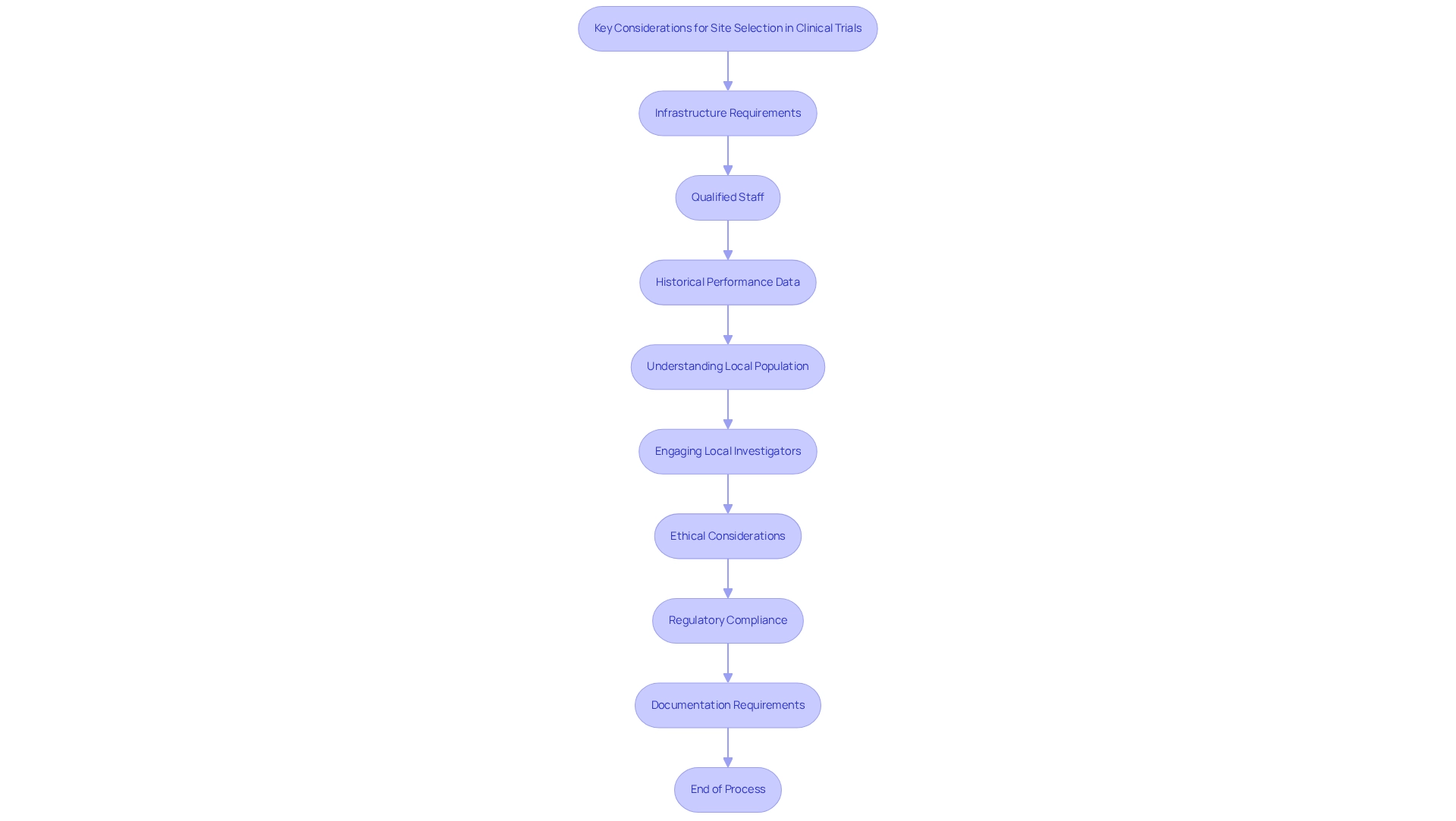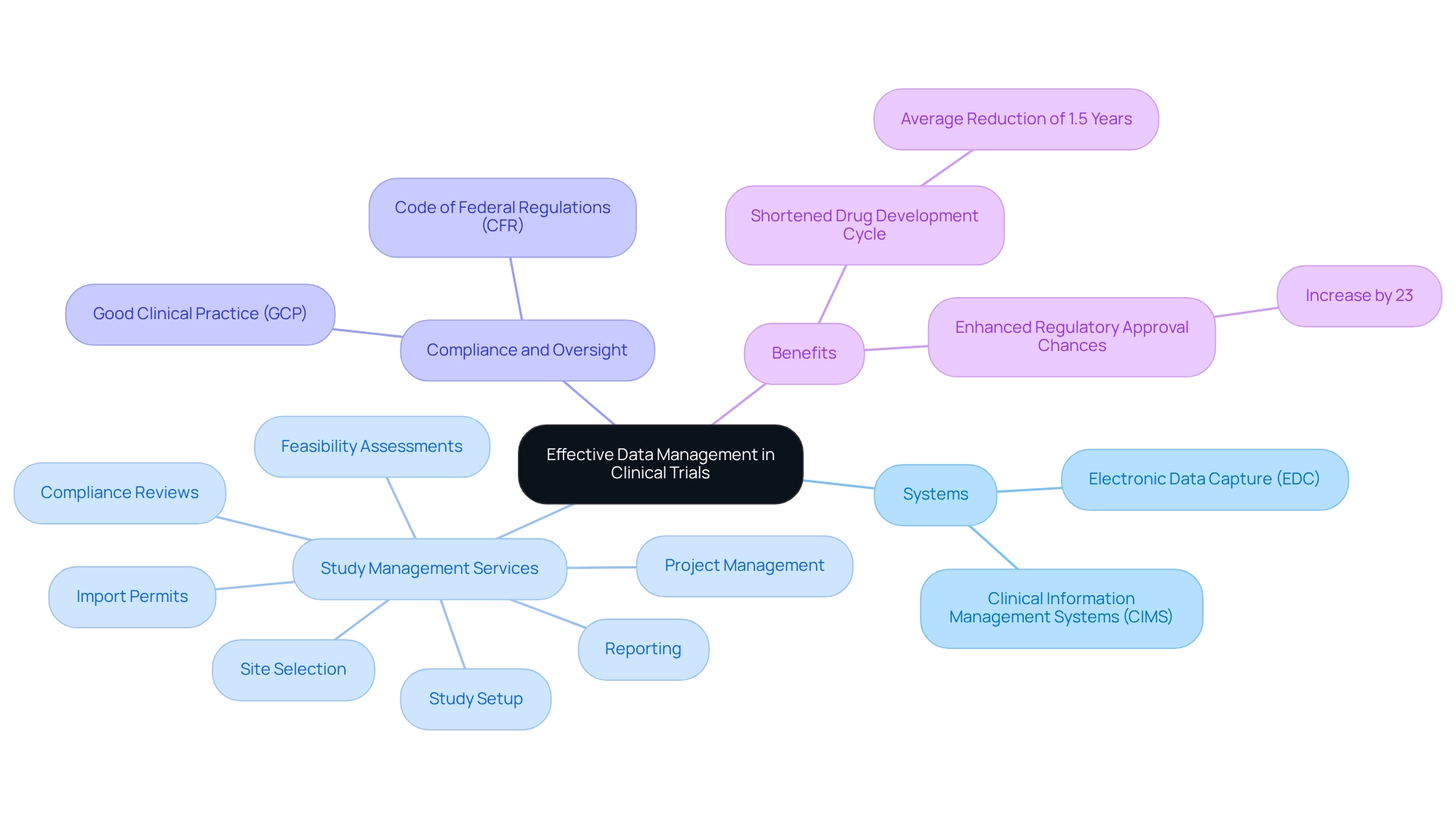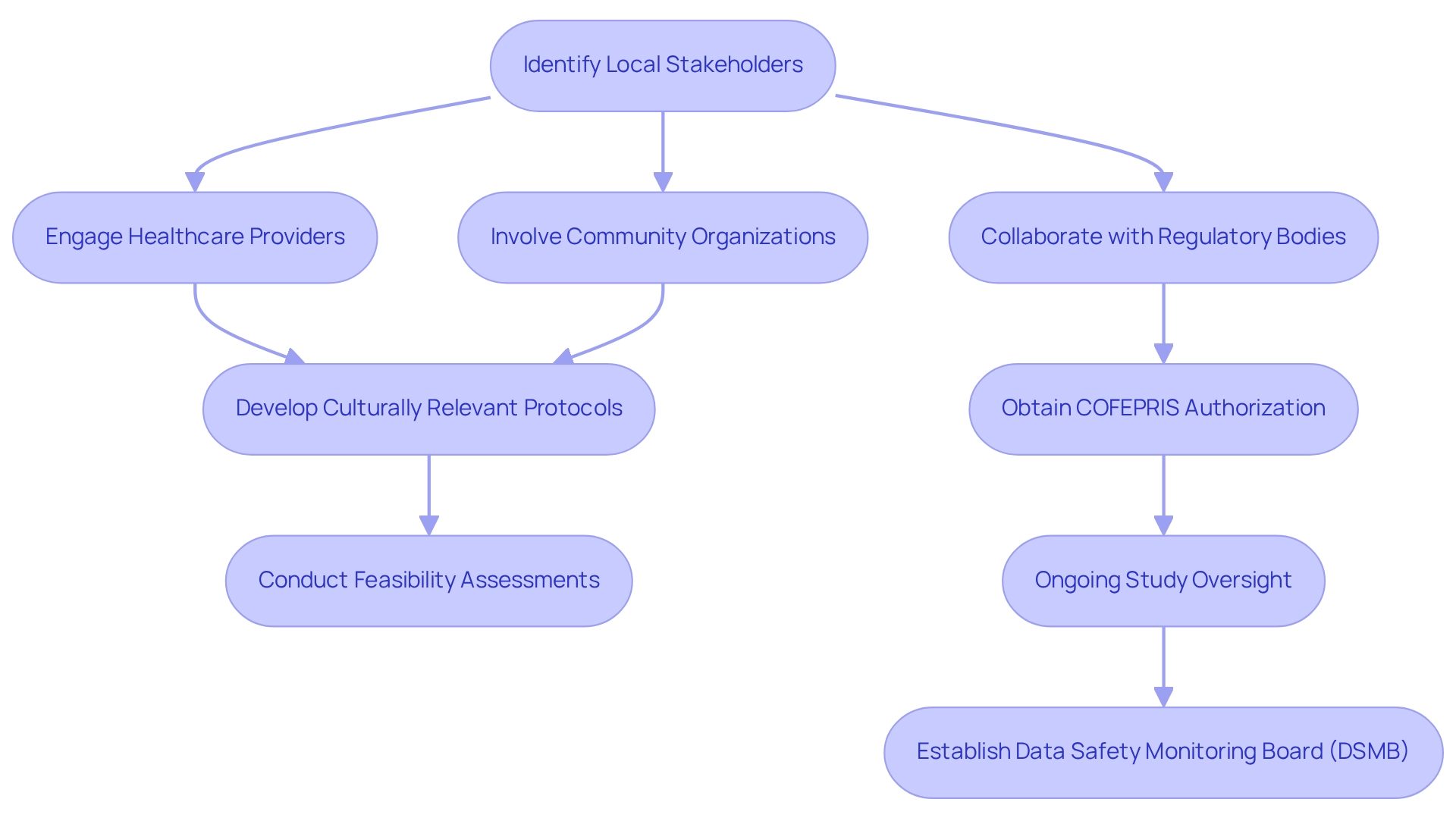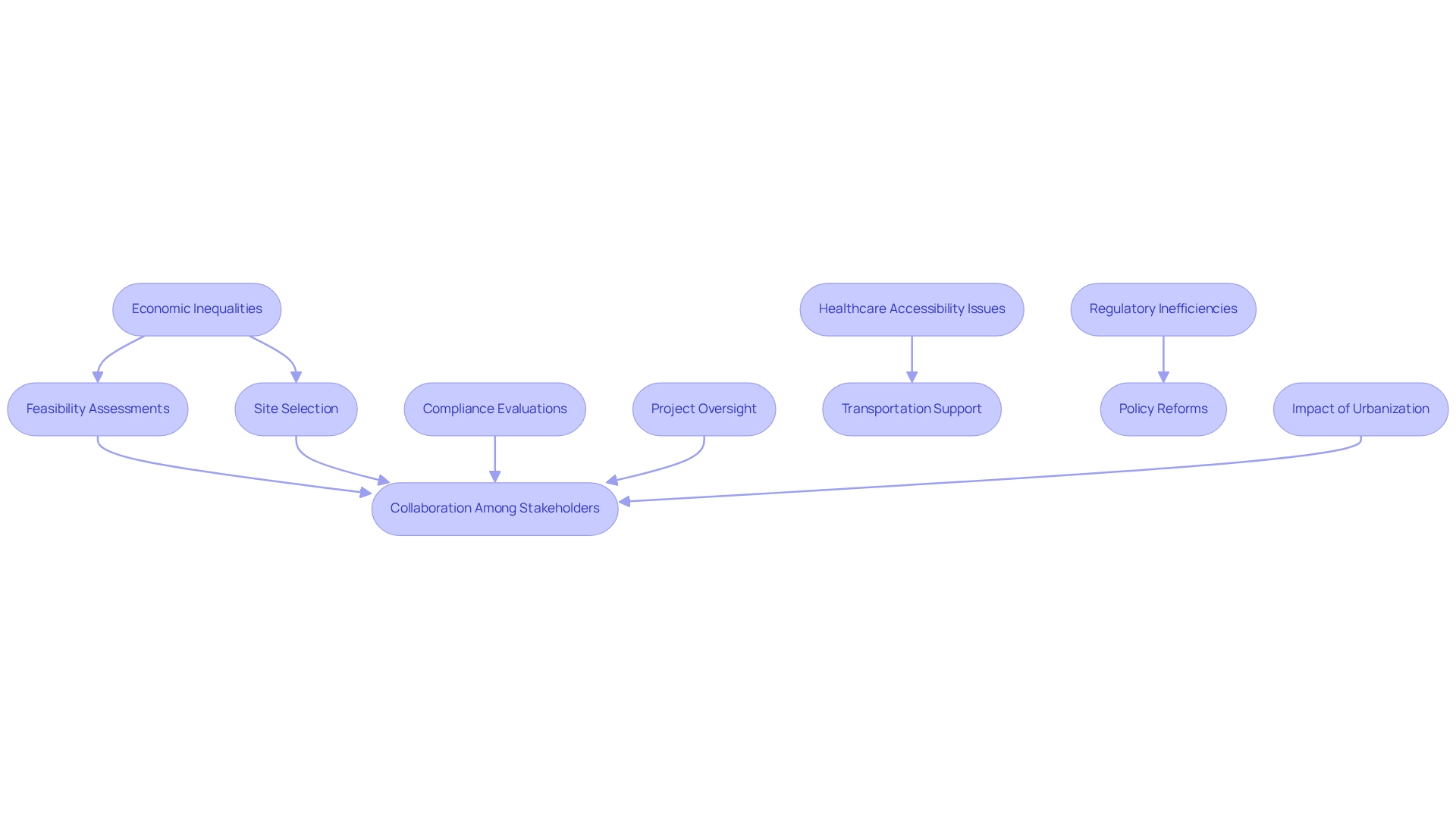Overview
The article delineates the foremost challenges in Mexican clinical trial design, encompassing:
- Regulatory complexities
- Recruitment difficulties
- Socioeconomic barriers that obstruct effective research execution
It underscores the critical need to:
- Navigate the regulatory landscape
- Engage local communities
- Implement culturally sensitive recruitment strategies
By addressing these obstacles, we can significantly enhance the success of clinical studies in Mexico.
Introduction
Navigating the intricate landscape of clinical trials in Mexico presents a unique set of challenges and opportunities for researchers and sponsors alike. The regulatory oversight of COFEPRIS, combined with the multifaceted dynamics of participant recruitment, necessitates a comprehensive understanding of this environment for successful trial execution.
As the demand for innovative medical solutions escalates, the need for effective strategies addressing the complexities of trial management, site selection, and data integrity becomes increasingly critical. This article delves into the key considerations for conducting clinical trials in Mexico, highlighting best practices and insights that can facilitate smoother operations and enhance patient engagement.
By examining the regulatory framework, recruitment hurdles, and the importance of collaboration with local stakeholders, it becomes evident that a strategic approach is vital for advancing clinical research in this evolving landscape.
Navigating the Regulatory Landscape for Clinical Trials in Mexico
The regulatory framework governing research studies in Mexico is primarily administered by COFEPRIS (Federal Commission for the Protection against Health Risks), which oversees the approval process. A comprehensive understanding of specific requirements, including the submission of a Clinical Trial Application (CTA) and strict adherence to ICH-GCP (International Council for Harmonization - Good Clinical Practice) standards, is essential for the successful execution of studies.
Recent regulatory updates have been implemented to streamline the approval processes; however, challenges in Mexican clinical trial design persist. The prolonged approval durations for medical studies in Mexico highlight the difficulties within the clinical trial framework, often resulting in timelines that exceed expectations and hinder the advancement of research initiatives. For instance, statistics indicate that the average approval duration can exceed six months, complicating the planning and implementation of medical studies.
Moreover, challenges in Mexican clinical trial design include obtaining local ethics committee approvals, a critical step that can introduce further delays. The requirement for Research Ethics Committees to consist of at least five members, ensuring balanced gender representation, adds another layer of complexity to the approval process. Additionally, the Biosafety Committee plays a vital role in ensuring protection against radiological risks, underscoring the multifaceted nature of regulatory compliance.
To effectively navigate these challenges, bioaccess offers extensive research management services, including:
- Feasibility studies
- Site selection
- Compliance reviews
- Setup
- Import permits
- Project management
- Reporting
Familiarity with COFEPRIS regulations and the evolving landscape is vital for sponsors to address the challenges in Mexican clinical trial design and avoid potential setbacks. Katherine Ruiz, an expert in Regulatory Affairs for medical devices and in vitro diagnostics in Colombia, emphasizes the importance of understanding these regulations.
As Bernardo Martinez-Negrete notes, "Galicia is ranked as the top firm in Mexico by renowned international publications including Chambers and Partners, among others," highlighting the significance of effectively navigating these regulations. Understanding the nuances of these rules not only aids in compliance but also enhances the likelihood of prompt approvals, ultimately facilitating more efficient research operations. As the regulatory landscape continues to evolve, awareness of recent modifications and their implications is crucial for successfully navigating the research environment in Mexico.
Overcoming Recruitment Challenges in Mexican Clinical Trials
The recruitment difficulties in Mexico underscore the complexities inherent in Mexican clinical trial design, which are influenced by cultural variations, socioeconomic barriers, and a general lack of awareness regarding research studies. Cultural factors are paramount; for example, language barriers can obstruct effective communication, making it essential to employ bilingual staff capable of bridging these gaps. Engaging local communities through culturally sensitive communication strategies is crucial.
This engagement involves providing transparent, easily digestible information about the benefits and drawbacks of participation, which can elucidate the research process for potential participants.
Socioeconomic factors also contribute to recruitment challenges. Many individuals may prioritize immediate financial needs over participation in clinical trials, necessitating the creation of strategies that address these concerns. Leveraging technology for outreach—such as social media campaigns and mobile applications—can enhance visibility and accessibility, particularly among younger populations who are more tech-savvy. Successful community engagement is vital for improving participant enrollment rates.
Research indicates that employing community-focused recruitment strategies, such as collaborations with local organizations and health clinics, can foster trust and encourage participation. For instance, in areas where home visits have been implemented, studies reveal a higher appeal among Hispanic and non-white individuals, underscoring the effectiveness of personalized outreach. As noted by Antidote, home visits significantly resonate with these demographics, with 62.4% of Hispanic individuals expressing interest compared to 40.2% of non-Hispanic individuals. To effectively tackle the challenges in Mexican clinical trial design, it is imperative to adopt culturally sensitive strategies that resonate with diverse populations.
This includes recognizing the unique cultural dynamics at play and customizing recruitment efforts accordingly. Furthermore, drawing comparisons with Colombia's regulatory landscape, which has successfully attracted research studies through its commitment to quality and community involvement, can provide valuable insights for enhancing recruitment in Mexico. By directly addressing the challenges in Mexican clinical trial design, study sponsors can significantly refine their recruitment strategies and ensure a more representative participant group in Mexican research.
Moreover, the independent review process achieving over 90% concordance in findings highlights the effectiveness of these recruitment strategies. Through these initiatives, bioaccess® is not only advancing medical research but also contributing to local economic growth and healthcare improvement throughout Latin America. Bioaccess® offers comprehensive management services for studies, including feasibility assessments, site selection, compliance evaluations, setup, import permits, project oversight, and reporting, ensuring regulatory excellence and effective navigation of the study landscape.
Key Considerations for Site Selection in Clinical Trials
Choosing suitable locations for research studies in Mexico necessitates navigating the complexities of Mexican clinical trial design, which demands a multifaceted strategy highlighting several critical elements. First and foremost, the site's infrastructure must be robust, equipped with the necessary technology and facilities to support intricate clinical research activities. Equally crucial is the presence of qualified staff; experienced personnel significantly influence the study's success by ensuring adherence to protocols and regulatory requirements, particularly given the challenges inherent in Mexican clinical trial design.
Examining historical performance data of potential sites is essential, as sites with a proven track record in previous studies tend to yield better outcomes. Furthermore, understanding the local patient population is vital. This involves assessing demographics, health conditions, and accessibility to the site, all of which can directly affect recruitment and retention rates. Engaging local investigators with established community relationships can facilitate smoother operations and enhance participant recruitment.
Their insights into local culture and patient preferences are invaluable for tailoring the research approach. For instance, in pediatric research, obtaining consent from minors capable of understanding the study is crucial, alongside parental approval, thereby upholding ethical standards while respecting the wishes of young participants.
As we look to 2025, the standards for site selection in Mexican studies will continue to evolve, reflecting the ongoing challenges in Mexican clinical trial design, particularly the importance of local patient groups and the expertise of local researchers. Recent data emphasizes that sites effectively incorporating these components demonstrate greater efficacy in medical studies, underscoring the necessity for a strategic approach to site selection in this dynamic environment. Moreover, it is imperative to consider the legal and technical requirements established by COFEPRIS for imported medications, as the challenges in Mexican clinical trial design highlight that compliance with these regulations is crucial for the success of research studies.
The REC's mandate to retain essential documents for up to five years post-investigation further underscores the importance of meticulous documentation in site selection. Additionally, as noted by Greg Koski, a project aimed at establishing a system of accreditation to enhance and ensure the quality, performance, and safety of research sites is becoming a reality. This accreditation will play a pivotal role in improving site quality.
Finally, with bioaccess® leading the way in research management services, sponsors and CROs can rely on their expertise in the ongoing oversight of studies and the establishment of independent monitoring committees to assess study progress and safety, which is essential for effective management. Bioaccess® specializes in Early-Feasibility Studies, First-In-Human Studies, Pilot Studies, Pivotal Studies, and Post-Market Clinical Follow-Up Studies, backed by over 20 years of experience in the Medtech sector.

Ensuring Effective Data Management and Analysis
Effective management of information in clinical trials is crucial for the systematic collection, storage, and analysis of data, ensuring both accuracy and compliance with regulatory standards. The execution of electronic data capture (EDC) systems plays a vital role in streamlining information collection processes and enhancing data integrity. These systems not only enable real-time data entry but also reduce errors associated with manual data handling.
Moreover, Clinical Information Management Systems (CIMS) are specifically designed for overseeing and evaluating research data, providing essential features such as data validation and inquiry management.
At bioaccess, our extensive study management services encompass:
- Feasibility assessments
- Site selection
- Compliance reviews
- Study setup
- Import permits
- Project management
- Reporting
Routine evaluations and oversight are critical components of a robust information management plan, facilitating the prompt detection and correction of inconsistencies during the testing process. Educating personnel on information management protocols is equally important; adherence to Good Clinical Practice (GCP) guidelines is essential for maintaining high-quality data.
In 2025, optimal strategies for information management in research emphasize the integration of comprehensive information management systems that support compliance with regulations such as the Code of Federal Regulations (CFR). Organizations that implement end-to-end information management solutions can significantly shorten their drug development cycle by an average of 1.5 years and enhance their chances of regulatory approval by 23%, according to the Pharmaceutical R&D Efficiency Index. This underscores the importance of selecting the appropriate information management system (IMS) tailored to the specific needs of a study, ensuring that functionality, compliance, usability, and integration features are thoroughly evaluated.
Case studies demonstrate that effective information management not only bolsters the integrity of research records but also contributes to the overall success of research initiatives. By prioritizing these practices and evaluating key factors when selecting a Clinical Data Management System (CDMS), research organizations can more effectively navigate the challenges inherent in Mexican clinical trial design and the complexities of study design in South America. Furthermore, statistics from Datavant Trials indicate that comprehensive data management solutions support organizations at every phase of research studies, highlighting their critical role in addressing the challenges faced in Mexican clinical trial design.

The Importance of Post-Market Clinical Follow-Up Studies
Post-market clinical follow-up (PMCF) evaluations are essential for the ongoing assessment of the safety and effectiveness of medical devices after they enter the market. These investigations are critical in identifying potential negative impacts that may not have been apparent during pre-market trials. In Mexico, conducting PMCF assessments is not merely a regulatory requirement; it is a vital practice that enhances patient safety and promotes sustained market access.
The regulatory framework in Mexico mandates that medical device manufacturers undertake PMCF research to gather real-world information on their products. This requirement is pivotal for compliance and ensures that devices consistently meet safety standards throughout their lifecycle. Companies are urged to develop comprehensive PMCF plans that clearly define objectives, methodologies, and timelines for data collection and analysis.
With over 20 years of experience in the Medtech sector, bioaccess® underscores the significance of PMCF research, which is crucial for generating clinical evidence that aligns with the device's classification and intended use. Our expertise spans managing various research projects, including Early-Feasibility Assessments (EFS), First-In-Human Trials (FIH), Pilot Trials, and Pivotal Trials, ensuring a tailored approach to meet each client's unique needs. As Jasper Van de Sande aptly states, "A well-structured PMCF plan can facilitate the efficient design and execution of follow-up activities, ultimately leading to better patient outcomes and informed decision-making."
Statistics reveal that organizations prioritizing PMCF research are more likely to identify and mitigate risks associated with their devices, thereby enhancing their reputation and trust among healthcare providers and patients alike. A case study titled "Developing a Strong PMCF Plan" illustrates this point, emphasizing the necessity of starting with clear end goals in mind. By focusing on the critical information necessary for successful commercialization, companies can ensure that their PMCF activities are not only compliant but also strategically aligned with their business objectives.
Moreover, contemporary tools like BioT, a cloud-based platform for PMCF data collection, automate compliance with regulations such as HIPAA and GDPR, providing essential support for adverse event reporting and sample size calculation. This integration of technology into PMCF processes highlights how bioaccess® employs innovative solutions to enhance research.
In conclusion, PMCF studies are indispensable for medical device companies operating in Mexico, acting as a bridge between regulatory compliance and a commitment to patient safety. By investing in robust PMCF strategies, organizations can navigate the complexities of the market while fostering innovation and improving healthcare outcomes.
Collaborating with Local Stakeholders for Successful Trials
Successful clinical studies in Mexico must confront the challenges inherent in Mexican clinical trial design, which hinge on robust collaboration with local stakeholders, including healthcare providers, community organizations, and regulatory bodies. Establishing strong connections with these entities not only streamlines operations but also fosters participant trust—an essential component for effective recruitment and retention. Engaging local investigators who possess a deep understanding of community needs and concerns significantly bolsters recruitment efforts, effectively addressing the challenges in Mexican clinical trial design by tailoring strategies that resonate with potential participants.
Moreover, tackling the challenges in Mexican clinical trial design is vital for integrating stakeholders into the design process, thereby crafting culturally relevant and acceptable research protocols. For example, the recent amendments to Mexico's GenHlthLaw, which emphasize mental health in research, illustrate how regulatory frameworks can adapt to promote inclusive participation. These developments facilitate the involvement of individuals with mental health conditions under specific circumstances, ensuring that risks are mitigated while maximizing potential benefits.
Informed consent in Mexico mandates the signatures of the participant, a legal representative, and two witnesses, alongside specific documentation requirements. This underscores the necessity of thorough engagement with participants to ensure adherence to regulatory standards.
Statistics indicate that once an official authorization from COFEPRIS is obtained, applicants are allotted a mere five working days to register this information in the RNEC database, highlighting the urgency of timely collaboration with regulatory bodies. Additionally, the sponsor or CRO bears the responsibility for ongoing study oversight and may establish a Data Safety Monitoring Board (DSMB) to ensure participant safety and data integrity throughout the research process.
At bioaccess, our comprehensive management services for studies encompass feasibility assessments, site selection, compliance evaluations, setup, import permits, project administration, and reporting on study status, inventory, and both serious and non-serious adverse events. By leveraging these capabilities, we not only enhance the efficacy of medical studies but also bolster local economies through job creation and advancements in healthcare. In conclusion, the success of research studies in Mexico is intricately tied to overcoming the challenges in Mexican clinical trial design through effective collaboration strategies with local stakeholders.
By prioritizing community involvement and harnessing the expertise of local healthcare professionals, research organizations can adeptly navigate the complexities of study design and implementation, ultimately leading to more successful outcomes.

Addressing System-Level and Structural Barriers in Clinical Trials
The challenges in Mexican clinical trial design—economic inequalities, healthcare accessibility issues, and regulatory inefficiencies—pose significant barriers to participation in research studies in Mexico. Economic disparities can limit access to essential healthcare services, thereby affecting the willingness and ability of potential participants to engage in research. A substantial portion of the population faces obstacles such as inadequate transportation and insufficient health coverage, which are critical impediments to minority involvement in research studies.
To effectively address the challenges in Mexican clinical trial design, it is crucial to implement strategies that foster equity and inclusivity in medical research. Bioaccess offers comprehensive study management services, including:
- Feasibility assessments
- Site selection
- Compliance evaluations
- Project oversight
These services can enhance access to study information through community outreach and educational initiatives, helping to demystify the research process for prospective participants.
Additionally, providing transportation support for participants can alleviate logistical challenges, ensuring that individuals from underrepresented areas can reach study sites with minimal difficulty.
Moreover, advocating for policy reforms that streamline regulatory processes is vital. For instance, current Mexican regulations mandate a second consent form to be signed by subjects, which must be articulated in simple language and include witness signatures. Simplifying these requirements could significantly lower barriers and promote broader participation, thereby addressing the challenges in Mexican clinical trial design and enhancing accessibility.
Case studies highlight the impact of urbanization on medical studies in Latin America, illustrating that population concentration in urban areas can lead to improved enrollment and retention rates. By strategically locating study sites in urban centers while ensuring accessibility for rural populations, researchers can boost participation rates across diverse demographics. As noted by Julio G. Martinez-Clark, the CEO, "The government of Colombia appears to be the sole nation in Latin America with a proactive effort to draw more research studies as part of its strategy to evolve into a knowledge economy by 2031," suggesting that similar initiatives could be beneficial in Mexico.
Ultimately, overcoming these structural challenges necessitates a collaborative effort from stakeholders within the research community—including scientists, regulatory bodies, and healthcare providers—to create a more equitable environment for trials in Mexico. By leveraging the expertise and services of bioaccess, such as import permits and nationalization of investigational devices, the clinical research community can stimulate economic growth, enhance healthcare outcomes, and promote international collaboration in Medtech.

Conclusion
Navigating the clinical trial landscape in Mexico necessitates a strategic approach that encompasses regulatory compliance, effective recruitment, and collaboration with local stakeholders. A comprehensive understanding of the regulatory framework governed by COFEPRIS is essential, as it dictates the approval processes and ethical considerations necessary for conducting successful trials. Despite recent updates aimed at streamlining these processes, challenges such as lengthy approval times and local ethics committee requirements persist as significant obstacles that must be addressed.
Recruitment strategies must also be culturally sensitive and tailored to the unique dynamics of the Mexican population. Overcoming socioeconomic barriers and enhancing community engagement through personalized outreach are crucial for improving participant enrollment rates. By fostering trust and utilizing technology for communication, trial sponsors can effectively connect with potential participants, ensuring a more representative and diverse participant pool.
Site selection plays a pivotal role in the success of clinical trials, emphasizing the need for robust infrastructure and qualified personnel. Engaging local investigators who understand the community’s needs can streamline operations and enhance recruitment efforts. Additionally, effective data management and post-market clinical follow-up studies are vital for maintaining data integrity and ensuring the ongoing safety and efficacy of medical devices.
Ultimately, the success of clinical trials in Mexico is closely linked to collaboration with local stakeholders, including healthcare providers and regulatory bodies. By prioritizing community engagement and leveraging the expertise of local partners, clinical research organizations can navigate the complexities of trial design and execution. This collaborative approach not only enhances the efficiency of clinical trials but also contributes to local economic growth and improved healthcare outcomes, paving the way for innovative medical solutions in the region.
Frequently Asked Questions
What is the primary regulatory body overseeing research studies in Mexico?
The primary regulatory body is COFEPRIS (Federal Commission for the Protection against Health Risks), which manages the approval process for research studies.
What are the key requirements for conducting clinical trials in Mexico?
Key requirements include the submission of a Clinical Trial Application (CTA) and strict adherence to ICH-GCP (International Council for Harmonization - Good Clinical Practice) standards.
What challenges are associated with the approval process for clinical trials in Mexico?
Challenges include prolonged approval durations, which can exceed six months, complications in obtaining local ethics committee approvals, and the requirement for Research Ethics Committees to have a balanced gender representation.
How does the Biosafety Committee contribute to the regulatory framework in Mexico?
The Biosafety Committee ensures protection against radiological risks, adding complexity to the regulatory compliance process for clinical trials.
What services does bioaccess offer to help navigate the challenges of clinical trials in Mexico?
Bioaccess offers services such as feasibility studies, site selection, compliance reviews, setup, import permits, project management, and reporting.
Why is familiarity with COFEPRIS regulations important for sponsors?
Familiarity with COFEPRIS regulations helps sponsors address challenges in clinical trial design and avoid potential setbacks, enhancing the likelihood of prompt approvals.
What recruitment challenges exist in Mexican clinical trial design?
Recruitment challenges include cultural variations, socioeconomic barriers, and a general lack of awareness regarding research studies.
How can cultural factors impact recruitment in clinical trials in Mexico?
Language barriers can hinder effective communication, making it essential to employ bilingual staff and engage local communities through culturally sensitive communication strategies.
What strategies can improve participant enrollment rates in clinical trials?
Strategies include employing community-focused recruitment methods, collaborating with local organizations and health clinics, and utilizing technology for outreach, such as social media campaigns.
How have home visits affected participant interest in clinical trials among different demographics?
Home visits have shown to resonate more with Hispanic individuals, with 62.4% expressing interest compared to 40.2% of non-Hispanic individuals, indicating the effectiveness of personalized outreach.
What insights can be drawn from Colombia's regulatory landscape for improving recruitment in Mexico?
Colombia's commitment to quality and community involvement in research studies can provide valuable insights for enhancing recruitment strategies in Mexico.
What impact does bioaccess have on medical research and local economies in Latin America?
Bioaccess advances medical research while contributing to local economic growth and healthcare improvement throughout Latin America.




